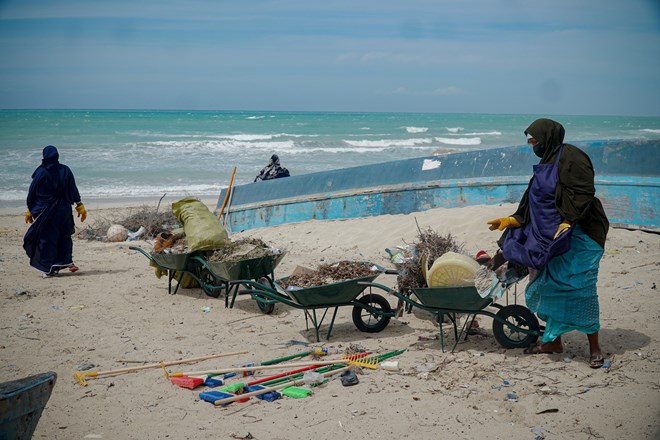
Friday November 5, 2021

On the warm shores of Adale, a coastal city 220 kilometres north of Somalia’s capital Mogadishu, Sakina Mahmoud Moalin, known by others as ‘Mama Sakina’, stands watching a group of women in yellow vests, shovels, and rakes in hand, picking up every piece of trash they find on their way.
“When there are community clean-ups at the beach or other areas, people come out and join,” says Sahra, a woman from Adale who is also part of the women’s group that is organizing the cleaning activity. “Everyone greets each other, people share conversations, and the community grows closer.”
advertisements
The women are strongly committed to their mission: to bring back the beauty of their city and beaches. After a long day of cleaning, they walk around the streets with loudspeakers, spreading messages on reducing waste and showing others how to maintain good hygiene practices to prevent diseases. Since July, the women’s efforts have become a familiar sight in the streets of Adale. The idea was born in a community consultation that brought together approximately 100 community members, half of them women, who came together to discuss activities that could benefit their town.
Led by Sakina, the women decided to start the weekly clean-ups, which they hope to continue for as long as necessary. “By cleaning up the garbage, we are enhancing our health and livelihoods. Cleanliness is the essence of our faith,” said Sakina.
To support their mission, the International Organization for Migration (IOM) trained 35 community members on environmental awareness and provided the necessary tools and protective gear to start the campaign.
“The training helped us understand all the risks that come from improper waste disposal,” Sakina added.
The activity is part of a larger Community-Based Planning (CBP) process led by the government and supported by IOM, which resulted in a Community Action Plan (CAP) – a participatory consultation method used to empower people to lead positive change in their communities by designing projects that are important to them.
As part of the activity in Adale, the women are also planting trees around the town to combat desertification, which could forcibly displace hundreds of people if no action is taken.
According to Mohamed Mohamud Adow, a young resident who got a tree planted in his backyard, “strong winds sometimes move sand, creating large dunes that displace people from their homes." The trees will help the environment while preventing dunes from forming near houses.
The prolonged drought periods in Somalia have increased conflict among community members as they scramble for water and pasture among other limited resources. Many residents agree the activity is not just about cleaning, but also about bringing together a community that has suffered the effects of conflict since the civil war broke out in 1991.
Somalia has been mired in intermittent periods of violence. In places like Adale, years of fighting between rival clans have damaged the relationships among its residents. Recurring drought, floods, and food insecurity have continued to devastate the lives of millions of people in Somalia, increasing the vulnerability of communities who are mainly reliant on natural resources for their survival.
“These types of projects are essential to restore trust between communities and government authorities in areas that have historically been in conflict,” says Daniel Norfolk, IOM Somalia’s Community Stabilization Programme Manager. “Our mission is to support these communities to lay the foundations for their recovery, while addressing climate change-related issues.”
When your life depends on the climate
According to latest data from the Internal Displacement Monitoring Centre (IDMC), in Somalia, natural hazards are now the first reason for displacement in the country, with the numbers of those fleeing disasters being higher than those migrating because of conflict. Just in 2020, floods and droughts push out of their homes over 1 million people, while conflict displaced nearly 300,000 people.
However, climate change is not a standalone issue, “it is also acting as a threat multiplier by exacerbating competition over grazing land and water resources, inducing more displacement and the recruitment of youth by armed actors,” added Norfolk.
Ahead of the COP26, IOM is committed to accelerating action towards the goals of the Paris Agreement and the UN Framework Convention on Climate Change by mainstreaming environmental considerations and climate change adaptation into all its interventions.
“Sometimes there are small disputes within our group, and it’s my job to remind the women that, here in our group we are not about clans, we are about our community; we have to set an example for Adale,” Sakina said.
Besides advocating for the environment, Sakina and the women’s group also serve as mediators when armed conflict occurs. She remembers an occasion where she, together with other women, accompanied the Governor of Adale on a peacekeeping mission to another town.
“We slept outside for three cold nights to try and stop an ongoing clash between two clans. With the same colour cloth tied on our heads, in harmony, we successfully convinced them to stop,” she recalls.
Now, the city is finding its own path to stability, and women are the ones taking the lead.
“Our group is based on unity, and not on clans. We want to collectively take part in acts that benefit our town, whether it is raising awareness, cleaning the town, or restoring peace when conflict arises,” she added.